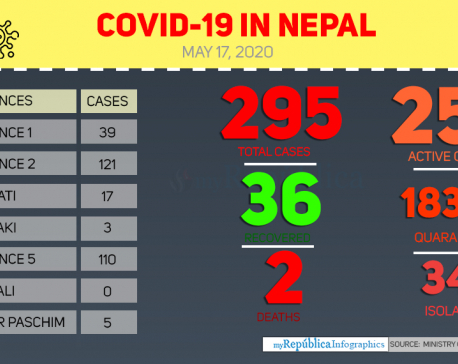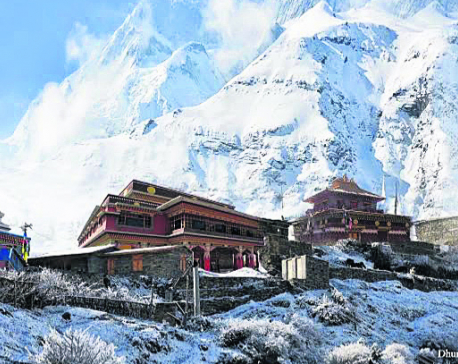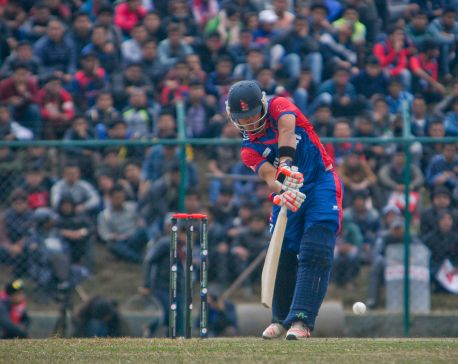
OR
BLOG
Understanding Roles and Responsibilities: An antidote to Problems
Published On: March 23, 2023 07:00 PM NPT By: Sijan Sharma

About 15 years ago, I attended a management school in Lainchaur, located on the same avenue as the British and Indian embassies.One day, I encountered a problem. I had been writingout pieces of narratives when bored in class. Later I’d go home, type them out and email them. But then, someone - a family member - accidentally stepped on the laptop, damaging the screen, and leaving me undecided about whether to fix the screen or buy a new one. I mean Laptop prices were dropping like how rockstars drop dead from time to time. They were losing their worth in terms of market value. It was a Toshiba, a great laptop to spend fifty percent of its original price for just the cracked display. As a result, I turned to writing songs and poems to entertain myself during class. One of my compositions, "Problems and Solutions," was later published, although the arguments themselves were not particularly significant. However, the composition may have been well-written since I often wrote without planning or forethought. Despite this initial success, I did not have anything else published until recently when Republica published one of my articles. With this experience, I am now writing a series of academic articles that will be descriptive, analytical, evaluative, and explanatory. I will support my ideas with relevant evidence and well-researched facts. Based on my recent publishing experience, I understand that newspaper articles must include real events, particularly in the political, economic, social, and environmental spheres, to remain relevant. Furthermore, articles should not harm anyone, even if they cannot help them. Therefore, the first article in this series is titled "Understanding Roles and Responsibilities: An Antidote to Problems."
In this article, I will focus on Nepal's national objective of becoming a developed nation by 2100 BS. I will discuss the importance of achieving this objective and highlight the challenges and obstacles that could hinder the country's progress. Additionally, I will share my opinion on how to address these issues, whether through confrontation or finding alternative solutions.
Furthermore, I will outline the roles and responsibilities that significant individuals and groups living and working in the country should assume. I will also discuss the initiatives that common people like you and I can take to work together and make a collective national effort towards achieving this goal.
The National Objective
I have come across several texts indicating that Nepal's goal is to become a developed nation by 2100 BS. A few years ago, I happened to watch Babu Ram Bhattarai tell an interviewer that he has the dream of seeing the country becoming a developed country by the twilight of his life. And considering his age, it is likely that he meant 2100 BS, rather than AD.And given that politicians will just speak things so that they can take credit for them if they turn out to be true in the future, it is obvious to me that Nepal becoming a developed nation by 2100 BS is in-fact a shared a national objective, a real goal for the next twenty years.
The need to pursue and achieve the objective
Human beings are complex creatures, each having a unique set of qualities. We are also social animals that create complex social organizations such as family, friend circles, business groups or a political organization. While we all seek to shape our individual identities, collective approaches help us retain our sense of identity and the groups serve to provide us some validity which we do not find in isolation. And the pursuit of objectives, lofty as they might be, can keep us organized and self -disciplined. They make us forward-thinking and encourage collaboration and can serve to promote harmony within our society. So, the national objective is in fact a call to action, from each Nepali citizen and every single group working within the country. But that is not the only reason why we should pursue these goals.
Some challenges
The country has been relatively stable politically, in recent months and years. But since there isn’t much forward thinking, and not much effort being put into the idea of becoming a developed nation, we are running the risk of another turmoil and we are running out of time. There is enough dissatisfaction among some political factions within the country. There are former representatives who are currently in depravity. And there also are some doings of some political groups that need correcting. If the country doesn’t move forward with its plans, there’s a risk of these significantly influential people and groups taking opportunistic approaches to power, out of bitterness and resentment when the current regime fails to accommodate national interests into their own agenda. Other than that, we will also soon have a situation where all the currently developed countries will have graduated to the status of advance economies, while we will be left pointing fingers at one person, group, or another. I thought about why the country’s economy is valued at only a third of the value the national treasury, or whoever, generated in the country, as per the data, I realized that the politicians are not the only ones to blame. The banks seem to be doing their jobs, providing numerous services, services that will be a key to the country harnessing the kind of order that developed countries and their economic systems have. However, we must not hesitate to call out the banks for actively pursuing to channel millions of rupees from hundreds of thousands of Nepali families each year to universities abroad. And I don’t know how much of it is legitimate.
We have been blind to our own tyrannies. The so-called practical education in countries like the US, in Europe and Australia are more often than not, excuses for children in well-off Nepali families to pursue a fantasy. Given that these students are, in some sense, like borders (in a hostel) during their studies, being far from the world they must do their work in, they are far from doing any real field work. I have nothing against emigration. Those are demographic trends and not in anybody’s hands. But saying that I will go abroad, gain quality and practical education, and apply my learning when I return to my country is largely a joke that I don’t find funny. WHERE WERE YOU WHEN THEY WERE KILLING AND DYING BY THE THOUSANDS? WHERE ARE YOU TODAY WHEN BEING CALLED TO ACTION? WHAT TIME HAVE YOU INVESTED INTO THE COUNTRY? WHAT AMOUNT OF TROUBLE DOES ANY OF YOU BEAR OR HAS BORNE?
Hopes for the future
Many influential people, political and other, are either resentful or completely beaten down due to recent events in politics and their lives, including Babu Ram Bhattarai and our well-loved Rabi Lamichhane. I am not worried that the resentment and bitterness will turn them into tyrannical, and perhaps even genocidal, opportunist. However, they still have some potential, that I feel should not be wasted. Rabi Lamichhane is a popular media personality. I really enjoyed how he called out someone “A Statue Thief”. That was blunt courage, even if a little funny. He has some qualities that I love. I am sure that now that the political thing turned out to be embarrassing for him, he’s smart enough to get back on his feet, that he’s responsible enough to understand that his real role in Nepal could be to fight corrupt and sub-standard practices in the media and social media. Things take time, and we all make mistakes. But as I said in my previous write-up, there should be a way for young people to get back and restart if we find that we have been on the wrong path.
Right now, the forces that be in power are busy continuing the tradition of placid sustenance of power and victory. Meanwhile overlooking the numerous problems that they invited, they really ought to consider checking, reducing, removing and hence, correcting their past mistakes. For example, maybe the problems such as hundreds of thousands of Indian citizens receiving Nepali citizenship were unavoidable at the time when they occurred. The practically jobless leaders of the Terai are in fact cool enough to understand that they must correct the fallacies that they invited. We will just have to be patient and give them a chance, meanwhile making it clear that their doings and non-doings will all be accounted for, in the next electoral audit.
Anyway, I failed to follow through on what I promised earlier in this article. So, maybe I will get back into some real issues, real problems in the next article. I want to make a case for the tourism and service industry in Nepal, that they need standardization. I want our policy makers to shift their attention from adopting a nationalistic attitude to an attitude of friendship with other countries, shifting from prioritizing the manufacturing industry to rather prioritizing only those manufacturing sectors in which we have a comparative advantage. The fallacies of the policies of expansion of manufacturing industries, trying to manufacture everything within the country, is based on the idea of absolute advantage and is often an easy thing to start but impossible to finish. I have personally observed a very large business group having to drop their heads in dismay because the Indian government retaliated with an equally nationalistic approach in order to protect their long-established industry of mining and sawing of semi-precious stones. And there must be many more business groups that have suffered in that fashion. And just in case I fail to ever write another article again, I want you to remember, our own lord Siddhartha Gautam asked us to be tolerant of others, be collaborative, and not take anything to the extremes.
And lastly, I have said most of the things I have wanted to, and I want my readers to express their ideas too. Unless your love draws me to express more, I do not demand that the public sector should delegate authority into the hands of public servants, that of making personal investments into infrastructures locally just because “I” believe I know exactly how, when, and why, and their activities to be monitored by locals, making them dutiful and an income. I may not even write the whole set of articles that I promised. I have unpopular opinions, unverifiable ideas on many topics. Yet I wish to exercise my constitutional right to expression, but without taking it to the extremes.
You May Like This

Health ministry confirms three new COVID-19 cases, number of total cases reaches 295
KATHMANDU, May 17: Nepal reported three new cases of COVID-19 on Sunday evening, taking the national tally to 295. ... Read More...

Dhurmus, Suntali to build ‘a Nepal within Nepal’
KATHMANDU, June 5: After successfully completing three settlement projects for earthquake victims and other communities, the actor couple Sitaram Kattel (Dhurmus)... Read More...

Nepal vs Kenya: Five crucial things Nepal looks for second match
KATHMANDU, March 12: Nepal is taking on Kenya on Monday in the second match of the ICC World Cricket League... Read More...







Just In
- Govt aims to surpass Rs 10 trillion GDP mark in next five years
- Govt appoints 77 Liaison Officers for mountain climbing management for spring season
- EC decides to permit public vehicles to operate freely on day of by-election
- Fugitive arrested after 26 years
- Indian Potash Ltd secures contract to bring 30,000 tons of urea within 107 days
- CAN adds four players to squad for T20 series against West Indies 'A'
- ‘Precast' technology introduced in the construction of bridges along Muglin-Pokhara road
- Leopard attack injures young man in Kanchanpur













Leave A Comment